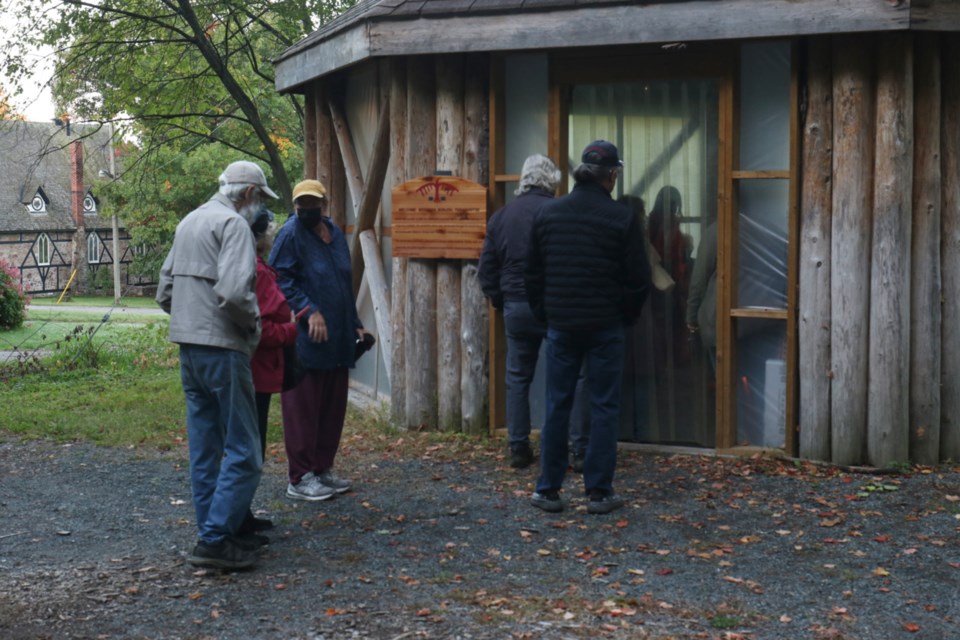An Orange Shirt Day event on the former site of Shingwauk Indian Residential School was well-attended Thursday, as members of the public gathered to recognize residential school survivors, their families and communities.
People spilled out of an arbour outside the university after a sacred fire was lit to start the day.
“I came to stand in the circle for the children of Shingwauk, and the lives that not only were lost here, but were greatly harmed here, as well as across this nation,” said Algoma University Anishinaabe Studies professor Andrew Judge.
Algoma University psychology student Mallory Solomon, a member of Constance Lake First Nation, doesn’t want non-Indigenous people to “apologize for their ancestors,” but wants them to acknowledge the privileges that came from the colonization of Indigenous Peoples.
“To acknowledge that we, as Indigenous people are being oppressed, even currently, from the genocide, from the past - and it’s still ongoing,” she told SooToday after leaving the sacred fire. “They have to help bring that to an end, the systemic racism. That’s what this day is to me.”
She said it will be hard to attend classes at the university, knowing that a search for unmarked residential school burials will be taking place on site.
“It is important to remember to acknowledge that there are children buried here, and that they need to be found,” Solomon said.
“I’m here to bear witness to...crimes against humanity of many Indigenous cultures of many Indigenous Peoples - and not to forgive our people, and not to forget what happened,” added Algoma University Students’ Union member Carina Joneit.
Dr. Theresa Turmel, an Indigenous author of a book specifically about residential school survivors in Walpole Island First Nation, told SooToday that she was initially shocked and angry when she found out about the residential school system as a student at Algoma University in 1991.
She quickly became an advocate for survivors.
“This day for me personally is extremely important. I believe it’s extremely important to the survivors and their families that there’s an acknowledgement of the hurt, the tragic circumstances. Finding those unmarked graves just sent a fervour through the whole country. Survivors were remembering - it brought back a lot of pain to the survivors, knowing that there was so many of our children laying in unmarked graves,” said Turmel. “They weren’t able to learn their teachings or hear the stories.”
“...the only crime that they did was being born Indigenous, and that’s the only reason they aren’t here. They weren’t allowed to live.”
Turmel distinctly remembers the late chief Dan Pine Sr. telling people that the Shingwauk Cemetery was “a lot bigger” than what it is today.
“All they knew is that they were being torn, taken from their families, their communities and put in a school that was foreign to them,” she said. “They were brought to the steps of the school, they went in. They had all their hair cut off, they had kerosene poured over their head. They were given a school uniform, all their clothes, all their belongings were taken away and burned. And they were assigned a number. They no longer had their traditional names.”
The guided tours of the Shingwauk site brought people to the cemetery where 72 residential school students rest in recorded, yet unmarked graves.
Sault Ste. Marie Mayor Christian Provenzano took part in one of the tours. He remembered playing in a nearby park as a child growing up around the corner. He would go through his entire childhood and the majority of his post-secondary education without knowing about the residential school system.
As mayor, he spoke with former senator and Truth and Reconciliation Commission chair Murray Sinclair. He asked Sinclair how he could make a “constructive contribution to the healing process and the reconciliation process.”
“And one of my takeaways from that was the need to listen. So that’s a lot of what I’ve been trying to do, and I think one of the most important things all of us who are non-Indigenous need to do, is recognize that truth comes before reconciliation - and there won’t be any reconciliation until we really come to learn about and understand what happened and its effects,” Provenzano said.
Shingwauk Indian Residential School operated in Sault Ste. Marie from the mid-1870s until its closure in 1970. The school was funded and administered by the Canadian government and operated by the Anglican Church until 1969.
A national residential school crisis line has been established to provide support to former students and their families. The 24-hour crisis line can be accessed at 1-866-925-4419.
